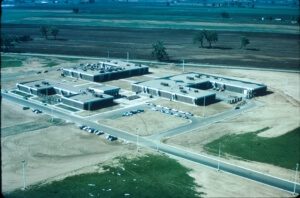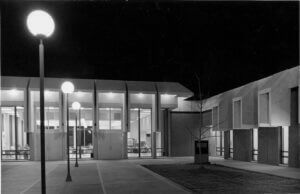Front Range Community College is celebrating its 50th anniversary this year. The school’s Larimer Campus came into being 30 years ago when Larimer County Vocational-Technical Education Center transitioned to become the Larimer County Center of FRCC.
The transition to a college.
The Voc-Tech Center started in 1972 under the ownership of a Board of Cooperative Educational Services set up by the Poudre (Fort Collins), Thompson (Loveland), and Park (Estes Park) school boards. In 1987, a 26-member committee recommended that the Voc-Tech Center become affiliated with a community college.
The school boards chose Front Range Community College, and requisite approvals from state agencies were attained. Even at its start, some of the news stories reported, the campus—with four buildings at Harmony Road and Shields Street—had space needs. It still does today.
The change was underway.
In “The Birth of a Community College,” Coloradoan reporter Bob Baun wrote on Aug. 7, 1988, that then-FRCC President Cary Israel said a library, expanded bookstore space, and more classrooms were “immediate needs.” Space was leased on College Avenue, then Oak Ridge Business Park, and the Westlake Shopping Center in Loveland. All this within first four years.
Was that enough space for a growing enrollment? Only for a while. In 1995, a portion of old Fort Collins High School on Remington Street became available, and it became FRCC’s Remington Campus.
A breakthrough for space needs was in the works.
When the Board of Cooperative Educational Services and the state of Colorado agreed to joint ownership of the land at Harmony and Shields, the state was willing to invest capital construction money.
In 1998, Challenger Point, Harmony Library, and a student-funded Longs Peak Student Center opened. Remington Campus was no longer needed.
Harmony Library is a joint-use facility that opened in partnership with the city of Fort Collins. At the time, joint-use libraries were rare in the United States. Today, the partnership is with the Poudre River Public Library District.
The next big construction project was Sunlight Peak, a new science building, which opened in 2010. Challenger Point, which had housed over-capacity science labs, was converted into a mathematics and general classroom building.
Still more construction.
Three years later, students felt such a need for more space that they voted to impose a student fee to contribute to a $32 million construction plan. First up was Little Bear Peak, a new building to house automotive technology, manufacturing and energy technology, and welding technology.
With those programs moved to new space, Redcloud Peak, one of the original buildings, could be renovated to house the Creative Arts, Design, and Humanities Department – art, CAD, interior design, music, dance, and theater.
Next up was the renovation of a wing of Blanca Peak, another original building, to house Veterinary Technology and Forestry, Wildlife, and Natural Resources.
The final phase was an expansion and renovation of Mount Antero, another original building, to house all student services, from admission to advising, financial aid to testing.
The dust never settles.
It’s been three years since the Larimer Campus’ last projects. This summer, Maroon Peak, the last of the four original buildings, was renovated for its current tenant, Horticulture and Landscape Technologies.
And don’t be surprised if you see more construction in the future. The 2018-19 Colorado general fund budget includes funds to start a new building for our existing Allied Health programs – Dental Assisting, Emergency Medical Services, Massage Therapy and Holistic Health, Nursing, Nurse Aide, and Phlebotomy – and whatever other health occupations northern Colorado needs.



